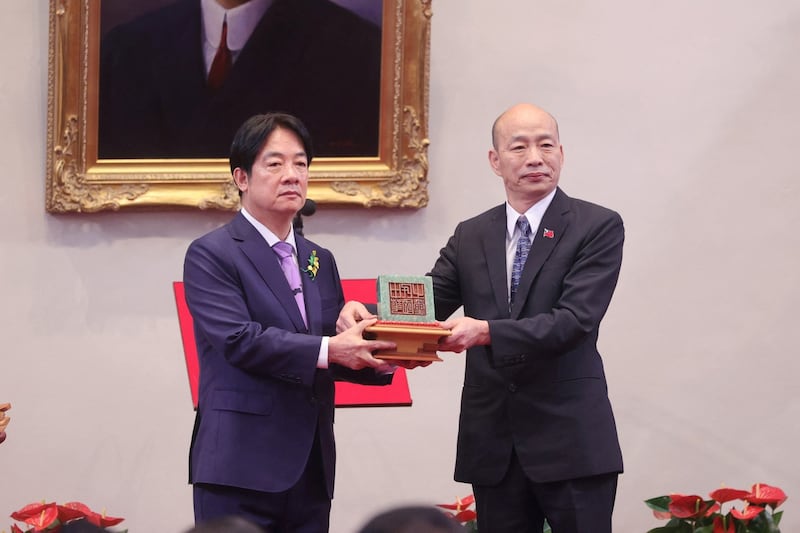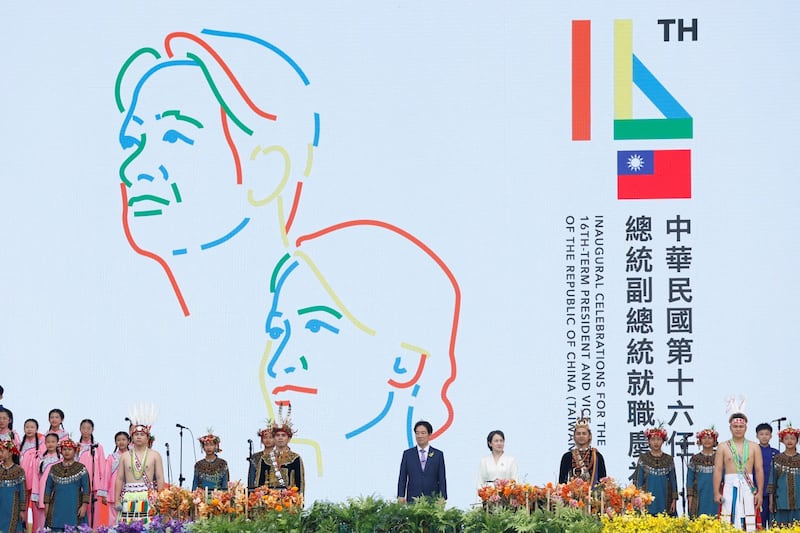UPDATED at 1:40 P.M. ET on 05-20-2024
Lai Ching-te called on China to stop its military and political threats, as he was sworn in on Monday as the fifth popularly elected president of Taiwan.
Lai, addressing a crowd outside the presidential office in central Taipei, repeated a call for talks with Beijing, which regards the democratic island as its territory and has never renounced the option of using force to bring it under control.
“I also want to urge China to stop intimidating Taiwan politically and militarily, and to take on the global responsibility with Taiwan to work hard on maintaining peace and stability across the Taiwan Strait and in the region, to ensure the world is without the fear of war breaking out,” Lai said.
“We also want to declare this to the world: Taiwan makes no concessions on democracy and freedom. Peace is the only option and prosperity is our goal for long-term peace and stability.”
Lai took office alongside Vice President Hsiao Bi-khim. His Democratic Progressive Party, or DPP, will be the first party to govern for a third consecutive four-year term since the democratic island held its first direct presidential election in 1996.
Lai and Hsiao won the election on Jan. 13 after taking about 40% of the vote.
During the inauguration ceremony at the Presidential Office, Lai wore a purple tie representing a butterfly native to Taiwan, as well as a yellow pin on his lapel depicting mustard flowers, a common plant across the island. He received two seals symbolizing his presidential power from the parliament speaker: the seal of the Republic of China and the seal of honor.
Both seals were brought to Taiwan when the Republican government fled to the island in 1949 after losing the Chinese civil war to Mao Zedong’s Communists.

Lai, a four-term legislator and two-term mayor of Tainan, served as premier from 2017 to 2019 under Tsai, and became her deputy in 2020 during her second term. He is the first vice president to become president since Taiwan began holding direct presidential elections.
Lai received loud applause when he reiterated that the Republic of China – Taiwan’s formal name – and the People’s Republic of China are “not subordinate to each other”.
“Fellow citizens, we have the ideal to pursue peace, but we must not have illusions,” he said. “Before China gives up using force to invade Taiwan, citizens must understand this: even if we accept all of China’s claims and give up our sovereignty, China’s ambition to annex Taiwan will not disappear.”
The swearing-in ceremony, which ended with a flyover of Taiwan’s F-16 fighter aircraft, was attended by outgoing President Tsai Ing-wen.
US, Tibetan officials attend ceremony
Also at the ceremony were former U.S. officials sent by President Joe Biden, lawmakers from countries including Japan, Germany and Canada, and leaders from some of the 12 countries that still maintain formal diplomatic ties with Taiwan, including Paraguay President Santiago Pena.
The U.S. and Japan extended their congratulations to Lai and expressed the hope that efforts to enhance bilateral relations will continue under the new administration.
In Washington on Monday, U.S. Reps. John Moolenaar, a Michigan Republican, and Raja Krishnamoorthi, a Democrat from Illinois, of the House Select Committee on the Strategic Competition Between the United States and the Chinese Communist Party said they looked forward to working with President Lai on issues facing the United States and Taiwan.
“The people of Taiwan have achieved decades of continued prosperity in the face of continuous threats and harassment from the CCP,” they said in a joint statement.
“Today’s inauguration is a promising reminder of Taiwan’s enduring commitment to democracy and how people around the world cherish the same freedoms and liberties we hold dear as Americans."
Representatives from the Central Tibetan Administration and members of the Tibetan parliament-in-exile participated in the inauguration ceremony, the most significant Tibetan government delegation to attend a large-scale presidential inauguration.
“We are here to rejoice and celebrate democracy in Taiwan because there are a lot of challenges Taiwan and Tibet both are facing — challenges of intimidation, coercion, the use of force [and] cyberwarfare,” said Dolma Tsering Teykhang, deputy speaker of the Tibetan parliament-in-exile.
The Tibetan delegation also attended the ceremony to ensure the revival of the Taiwanese Group for Tibet, Taiwanese parliamentarians from various political parties who work with similar organizations overseas to help defend the human rights and freedom for Tibet, Teykhang said.
“We look forward to not only learning from each other's democratic values and the shared interests that the Taiwanese people and the Tibetan people aspire to — human rights, the dignity of one's own identity [and] the preservation of [one’s] own culture,” she said.
“So, we are here to learn from each other and to come together as a force to challenge the communist totalitarian regime,” Teykhang said in a reference to China.
‘Maintaining the status quo’
China’s Taiwan Affairs Office said on Monday that Lai sent “dangerous” signals that seek to undermine peace and stability.
The current situation in the Taiwan strait is “complicated and grim,” the office said in a statement responding to Lai’s inauguration speech.
Lai said his government would “maintain the status quo”.
Alexander Huang Chieh-cheng, a professor of international relations and strategic studies at Tamkang University, said Lai would “not rock the boat.”
“At the beginning of his presidency, as promised, he will play it safe and continue Tsai’s national security policies in general terms,” the professor said, adding that Lai did not have a deep bench of national security experts of his own and needed the incumbents to stay on for the time being.
“Lai may take his own approach to cross-strait policy if Beijing exerts too much pressure on him. The next four years are going to be stormy for Taiwan and many neighbors,” he told RFA.
Norah Huang, research fellow at The Prospect Foundation, a government-affiliated think tank, said one of Lai’s top priorities would be to strengthen Taiwan’s self-defense while managing relations with China.
“The new defense minister Wellington Koo has revealed he will focus on pushing forward asymmetric defense and reservist reform. Koo was a core member of Tsai Ing-wen’s national security team. His appointment and statement reflects a more forceful implementation of the policies,” she said.
But Huang said Lai’s main message on China policy was to maintain the status quo.
“We’ll have to see how the Chinese respond. There’s a possibility to have some kind of engagement between the DPP and China.”

China regards Taiwan as a renegade province that should be reunited with the mainland, by force if necessary. Since separating from mainland China in 1949, Taiwan has been self-governing.
Tensions have increased since Tsai’s administration took power in 2016, refusing to acknowledge the “One China” principle. During the January election, China’s actions, including floating balloons through Taiwanese airspace and deploying aircraft carriers in the Taiwan Strait, exacerbated tensions and increased public dismay.
China has convinced several of Taiwan’s diplomatic allies to shift recognition to Beijing in recent years, leaving only 12 countries maintaining official relations with Taiwan.
Lai’s domestic challenges also loom large. The DPP has recently faced criticism for becoming the establishment, particularly from the younger generation. Under Tsai’s rule, issues like slow wage growth, high housing costs, and power shortages have become points of contention.
Despite winning the presidential election, the DPP lost its majority in the legislature with the loss of some seats in elections.
Edited by Mike Firn.
The story was updated to add reactions from the United States, japan and China as well as comments from U.S. Reps. John Moolenaar and Raja Krishnamoorthi and Dolma Tsering Teykhang, deputy speaker of the Tibetan parliament-in-exile.

